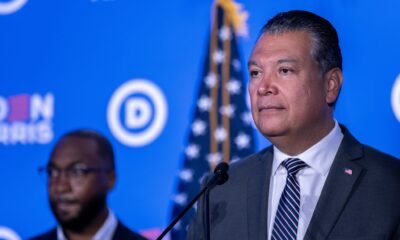analysis
Democratic Chairman Az Must Refocus on His Responsibilities

Arizona’s Democratic Party faces significant internal strife following the appointment of new state party Chairman Robert Branscomb. His actions have reportedly alienated key party figures, including U.S. Senators Mark Kelly and Ruben Gallego, Governor Katie Hobbs, Attorney General Kris Mayes, and Secretary of State Adrian Fontes. This tumultuous transition comes after the party’s underwhelming performance in recent legislative elections.
Branscomb’s leadership has been characterized by a contentious public dispute with established party figures, sparking discussions about the broader implications for Arizona Democrats. Notably, this discord highlights a rift between local party members and national party leaders. Many argue the establishment operates in a bubble, disconnected from the grassroots base, which seeks more significant representation and inclusivity within the party.
Branscomb’s initial decisions included terminating the party’s executive director and promoting an interim replacement, operations that seemed to straddle organizational reform and power consolidation. However, after a national search, he ultimately reverted to the staffer he had previously elevated, prompting disapproval from elected officials who felt sidelined.
In a public letter, Branscomb defended his choices, asserting that no elected official should intimidate the party chair for prioritizing the party’s best interests. He expressed his commitment to independence, insisting that pressure from prominent Democrats threatens the party’s integrity. Critics, however, maintain that the role of state party chairs is to support existing leadership rather than impose unilateral decisions.
This conflict raises questions on party strategy as it heads toward potential no-confidence votes. A two-thirds majority could remove Branscomb, yet such a scenario remains uncertain. Party insiders speculate that Branscomb’s continued defiance might further isolate him within a party already struggling for coherence and alignment.
The frustrations regarding recent legislative losses are not isolated; they reflect long-standing grievances within the party’s activist circles. Many Democrats argue that the focus has shifted too heavily to national elections while neglecting essential local dynamics critical for effective governance.
A historical context reveals the party’s past victories overshadowed by recent setbacks, which coincided with a Republican surge under unified leadership. Moving forward, Arizona Democrats may need to address their internal controversies if they wish to regain competitive footing in future elections.


















